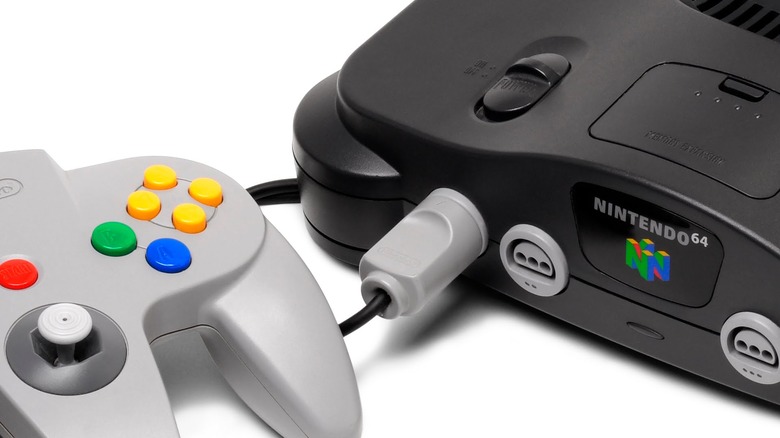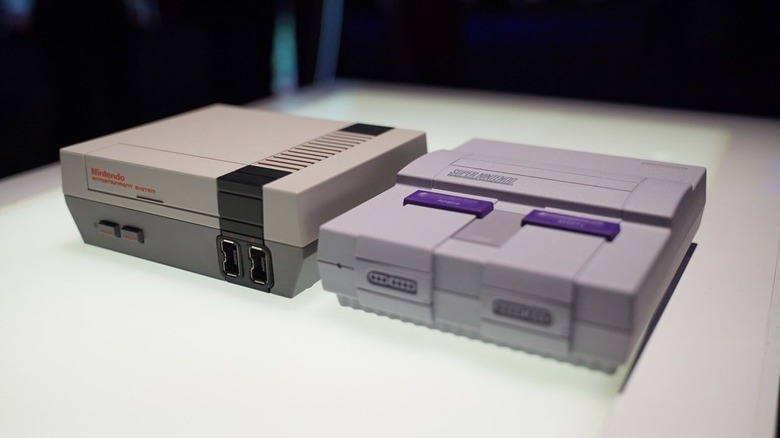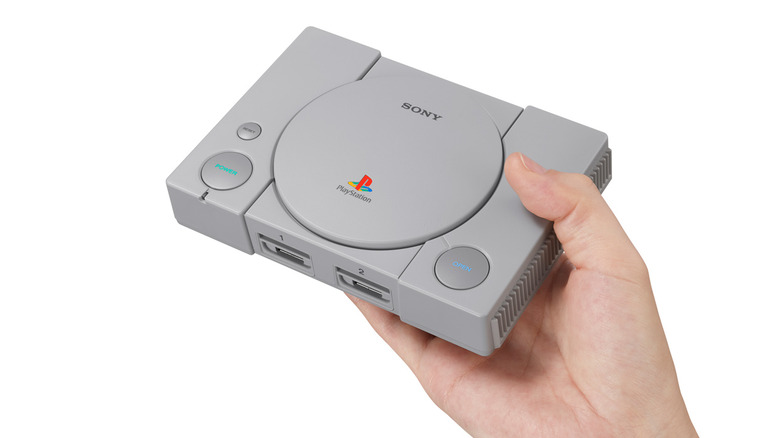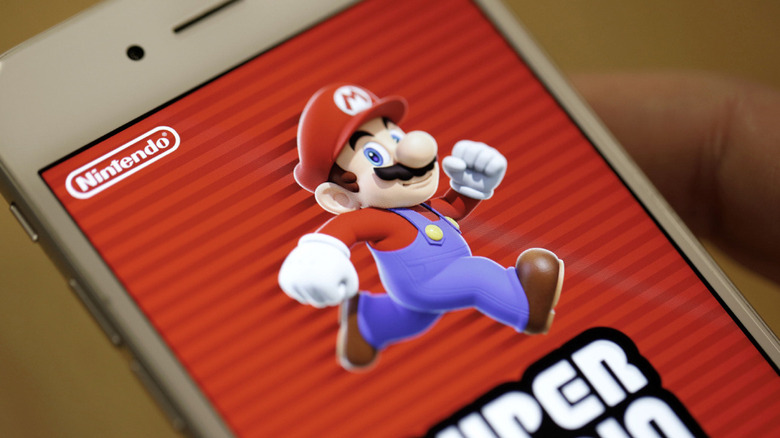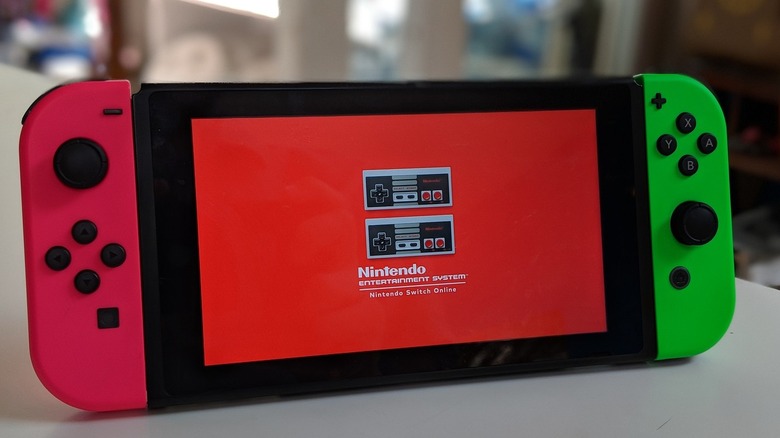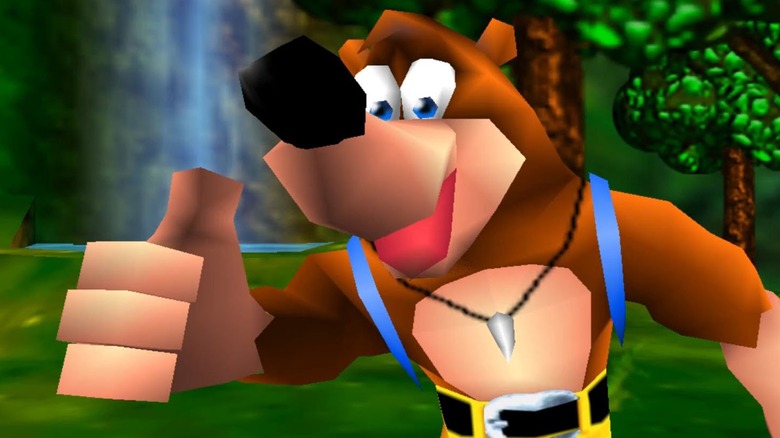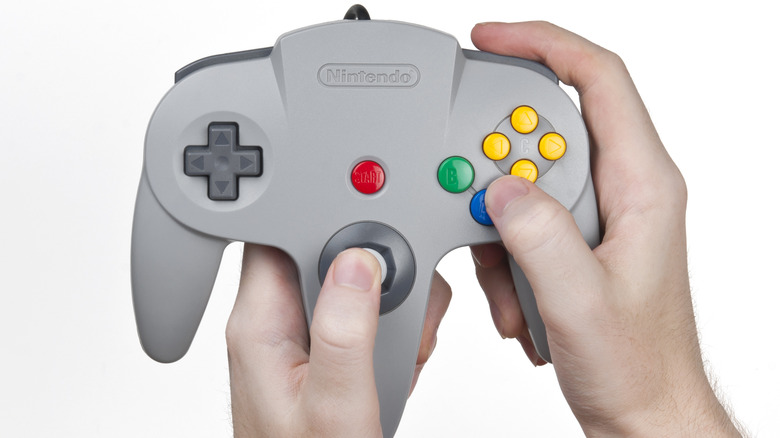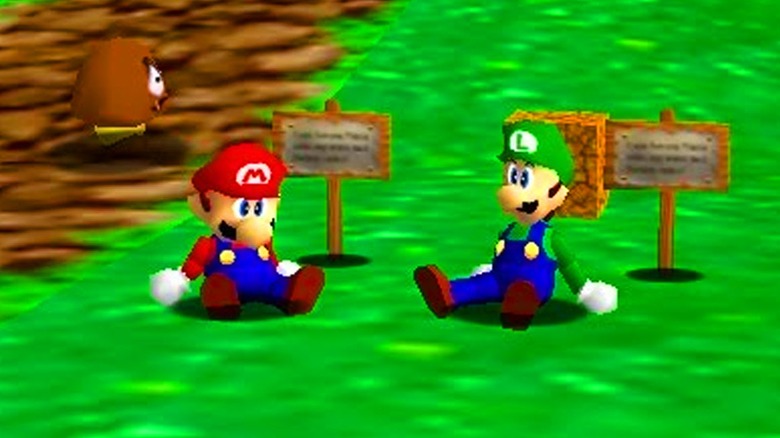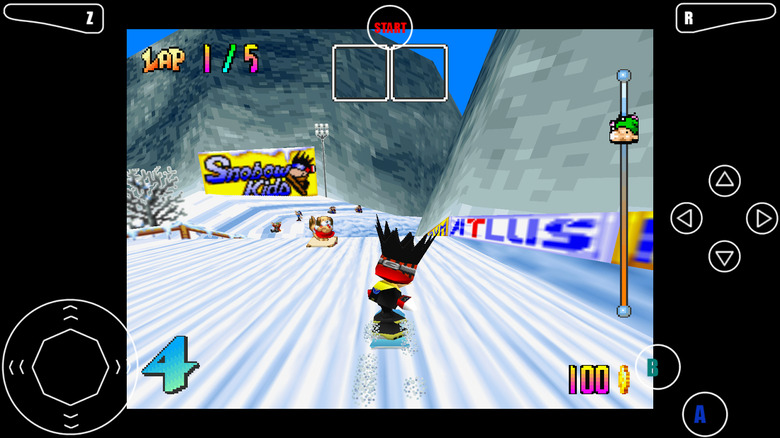Why You May Never See An N64 Classic
The introduction of the Nintendo Entertainment System Classic brought with it a whole world of possibilities. Nintendo hadn't just helped millions of gamers relive the best parts of their childhood: the company had instigated the development of an entirely new genre of gaming, a hybrid of emulation and aesthetic that hit just the right note for a lot of different demographics.
With other companies now getting in on the fun, it appears that Classic systems are going to become a regular thing. With that being said, though, one of the most beloved consoles of all time might not be on the shortlist of devices we'll see in miniature form any time soon. Here's our reasoning for why, sadly, you may never see a Nintendo 64 Classic.
Nintendo's Classic consoles had a very specific purpose
It's hard to deny that the NES and SNES Classics were successes by any conceivable metric. Inventory issues aside, both mini-consoles overperformed for Nintendo, quickly outstripping their projected sales metrics and leading to the kind of holiday craze we hadn't seen since the glory days of the console wars.
The fact of the matter is, however, Nintendo is a company that cares about much more than just the bottom dollar, and historically it has also been a company that stubbornly refuses to change its charted course regardless of feedback from critics or consumers. One need only glance at the long, painful lifespan of the Wii U to see that kind of belief in action.
What does this have to do with the N64 Classic, you ask? Well, in short, everything. Nintendo saw the NES and SNES Classics as once-in-a-lifetime opportunities to rehash some of gaming's most nostalgic platforms and the classics they spawned. This was because the company was in a bit of an awkward financial term that saw the end of the Wii U and the launch of the Switch just far enough away from each other that Nintendo was in danger of missing out on the industry staple holiday cash-in.
Nintendo believes that the Classic consoles were one-off opportunities to both cash in on nostalgia and help tide fans over before the Nintendo Switch launch. The company is much more focused on the Switch now.
The market for Classic consoles might be shrinking
This one is a little strange in the context of what we just said about the NES Classic and the SNES Classic, but hear us out. While Nintendo's two iterations of nostalgia bundled into a cute miniature aesthetic did quite well from a sales perspective, they were also two of the most hyped video game releases in quite some time, save perhaps Nintendo's Switch console as well.
Looking to capitalize on what appeared to be a brand-new market ripe for the picking, Sony got in on the fun and announced the PlayStation Classic. While that console was also initially met with some extremely positive feedback, as the months went on, things took a turn for the worse. The game lineup was revealed and criticized for being pretty soft, missing some of the staples of PlayStation history like Tomb Raider. Reviewers went hands on with the device and found it lackluster, absent any truly special inclusions or selling points to make it more than just a glorified emulator.
While part of that reception was definitely on Sony, it's not hard to imagine that we're now experiencing a bit of a burnout among old school gaming fans. These kind of Classic consoles only really appeal to a certain generation of video game fans. There's only so much demand for premium video game items that aren't actually anything new, and we might be seeing where the limit on that demand is. For that reason, Nintendo avoiding an N64 Classic might be a smart move.
Nintendo has other interests
Classic consoles are nice, but they don't really shake up the market in any meaningful way, and they certainly don't help companies gain ground on competitors in terms of innovation and future tech. Rehashing the past leaves the company in danger of forgetting about the future, something that would be especially egregious given the success of the Switch, a unique hybrid console that has carved out more than a niche market for itself.
Beyond the Switch, Nintendo is aggressively attempting to establish itself as a major competitor in the mobile gaming market. Mobile games have proven to be lucrative, especially when they have a Nintendo license attached to them; Pokemon Go is a smash hit, but even Super Mario Run has managed to rake in the dough despite a much tamer reception upon its launch.
If Nintendo truly believes that consoles aren't where the smart money is, it might not be interested in using the company's resources to produce a miniature outdated one. Nintendo could instead use that time and effort to better situate itself within a growing and competitive handheld market, establishing a name for itself now to ensure future success later.
Nintendo's online subscription will have N64 classics ... probably
The NES and SNES Classic came at a time when Nintendo was bridging the gap between the Wii U and Switch. The Wii U was also notorious for never truly supporting its online capabilities in the ways it could have; virtual console was a big deal for a lot of gamers, but never amounted to much, largely because the Wii U itself was pretty inaccessible thanks to an incredibly small library of must-own titles.
Nintendo is glacially slow to announce anything to do with online, and it's even slower when it comes to actually rolling them out. With that being said, though, there's at least thirty different classic NES titles on the Nintendo eShop already, many of which overlap with what was put out on the NES Classic when it launched. That indicates that Nintendo is willing to circumvent its own Classic offerings to make sure that its online subscription service is a worthwhile one.
In that case, then, it seems like only a matter of time before the Nintendo Switch's online subscription service includes access to some N64 classics. Nintendo hasn't outright denied that we won't see later consoles get the same treatment the NES has on the eShop, and the company seems very aware that it needs to make its online services more competitive. Don't be surprised if that means titles like Super Mario 64 end up on the Switch rather than an N64 Classic.
Licensing issues would be a nightmare
Ah, the words every Super Smash Bros. fan has dreaded over the last few iterations of the franchise: "licensing issues." They're at the heart of why some of the most in-demand characters haven't ended up in Super Smash Bros., and they're also a key reason why we may never see an N64 Classic.
The licensing issues begin with the knowledge that many of Nintendo's best N64 titles were produced by Rare, including Banjo-Kazooie, Perfect Dark, and GoldenEye 007. Those games are locks for inclusion in an N64 Classic console. They are part of what made the N64 such a dominant force.
Unfortunately for Nintendo fans, the company never bought Rare outright when the company was up for grabs, and Microsoft now owns the legendary studio. That means Rare's N64 games are protected under a very complex licensing web, and it also means Nintendo would have to produce an N64 Classic without these titles or pay a hefty sum, neither of which sounds appealing. While Xbox boss Phil Spencer has gone on record as saying he'd be happy to work with Nintendo to get Banjo in Smash Bros., Nintendo hasn't even taken him up on that, indicating that the company would likely never entertain the idea of bringing Rare games onto an N64 Classic console, since the cost and effort would be much higher than just bringing Banjo onto the Smash roster.
The N64 controller is pretty bad by modern standards
Nostalgia sure is a killer. In a world where people genuinely clamored to get the original Xbox controller back into circulation for reasons we can only dare to imagine, it's pretty clear the fog of time makes gamers look back on things we used to dislike in a much more forgiving light.
Let's get this out of the way: the N64 controller is just not very good. It has one of the most bizarre shapes a controller has ever taken, adopting a three-pronged approach that was criticized at the time because, well, not many people have three hands, and there were buttons or analog sticks associated with all of the prongs. While the controller functioned well enough in spite of this bizarre design choice, it's still one of the worst iterations of a Nintendo-owned controller schematic.
The kicker here is that, unlike the Xbox's original design, people aren't even that into the idea of the N64's controller making a comeback. There was a Kickstarter over two decades after the N64 first released that showed more than a few people disliked the system's controller. The crowdfunding project was to redesign the N64 controller entirely, ditching the three-pronged approach altogether, and it got funded. Somehow, two decades after the console's heyday, a project to fix its awkward controller was still enticing enough that people spent money to do it. That's not an encouraging sign for Nintendo, and could be yet another reason the company would like to avoid sinking too many resources into an N64 Classic.
The N64 actually wasn't that popular in Japan
The Nintendo 64 was a very strange console. Not only did it feature a truly baffling controller design, it also kept cartridges as the vehicle for its games when other companies began moving toward discs with the devices they released around the same time period. Nintendo has always had its own way of doing things, and that hasn't always translated to success in both Western and Japanese markets.
The Nintendo 64, simply put, was not much of a hit in Japan. The console did very poorly in that country, with popular games sometimes selling as much as five times more copies in the West than in Japan, a shocking figure at the time. The console just wasn't catching on the same way that other consoles from Nintendo had in the past, and it showed in the way that Super Mario 64 and other iconic titles moved off the shelves at a fraction of the rate they did in Western markets.
While the N64 remains a beloved figure in the West, the fact is it doesn't hold nearly the same kind of nostalgic value in Japan. That might be reason enough for Nintendo to avoid attempting an N64 Classic.
N64 emulation isn't very smooth at the moment
Sony's willingness to license an open-source emulator program for its PlayStation Classic opened the door for other industry leaders to investigate doing the same. There are some very tangible benefits to the decision: the software has already proven itself under the rigors of years of testing, it takes very little time to integrate into a new device, and it saves teams of people from developing a new emulator for an outdated product.
Since many of the arguments against the development of an N64 Classic ultimately boil down to the console taking too much time and brainpower away from the burgeoning superpower that is the Switch, it would logically follow that Nintendo could attempt to license its own open-source emulator as a time-saving measure.
There's just one problem, though. Despite having two decades of work behind it, the state of N64 emulation is actually way behind many other consoles. According to open-source developers, there are a number of reasons for this, ranging from the size of the teams who worked on it back when the N64 was a more relevant choice for emulation to the console's notoriously blurry graphics, which cause issues for people attempting to convert that into high-performance emulation.
Whatever the case may be, the N64 doesn't have an obvious choice of emulator that Nintendo could just license for an N64 Classic. That, plus the fact that the N64 is notoriously hard to create a great emulator for, means more work for Nintendo, which in turn means the potential of an N64 Classic hitting the shelves becomes even more unlikely. Maybe it's better to just let this one be a glorious, Piranha Plant-filled pipe dream.

